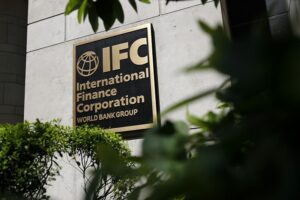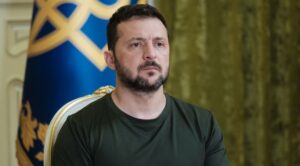
Initial registrations of new and used buses (including minibuses) in Ukraine in November 2025 increased by 19% compared to the same month last year, to 308 units, according to UkrAvtoprom on its Telegram channel.
Compared to October of this year, when 225 buses were registered, the market grew by 37%.
The share of new vehicles in November’s volume was 51%, compared to 63% last year.
As in the previous year, Ataman of the Cherkasy Bus plant leads among new buses with 57 units, which is 18 more than in November 2024 and October 2025.
Second in the ranking were buses from the ZAZ Zaporizhzhia Automobile Plant, with 30 units, which also took second place last year with 39 vehicles.
Isuzu buses came third in the ranking with 20 units, which were not among the ten most popular last year, while Etalon buses from the Chernihiv Automobile Plant did not make it into the top three in November (last year they ranked fourth with 18 vehicles).
Among the most frequently registered used buses in November were Mercedes-Benz (46 units), VDL (34 units), and Van Hool (15 units).
According to UkrAvtoprom, in January-November 2025, a total of 2,421 buses were added to Ukraine’s bus fleet (+27% compared to the same period in 2024), of which 1,203 were new (+9%) and 1,218 were used (+50%).
As reported, in 2024, initial registrations of new and used buses decreased by 19% compared to 2023, to 2,241 units, including new buses by 24%, to 1,296 units, and used buses by 12%, to 945 units.

Uzbekistan’s gold and foreign exchange reserves reached $61.23 billion as of December 1, 2025, according to data from the Central Bank. This is the highest figure since statistics began in 2013.
In November, reserves grew by another $1.9 billion (+3.2%), and since the beginning of the year — by $20 billion (+48.7%).
The main factor behind the growth was again gold, which rose in price on world markets.
According to the Central Bank’s estimates, the price increase from $4,013.2 to $4,159.4 per ounce (+3.6%) added about $1.8 billion to reserves (in September — $4.6 billion, in October — $2.5 billion).
The physical volume of gold has been increasing for the second month in a row. In November, it grew by 310,000 troy ounces (9.64 tons) to 12.23 million ounces (380.4 tons).
The value of gold reserves increased by $3 billion amid rising prices and reached a historic high of $50.86 billion. Gold now accounts for about 83% of all reserves.
At the same time, the currency portion of reserves decreased by $1.1 billion to $9.8 billion.
The volume of securities increased by $503.3 million to $1.53 billion.

The International Finance Corporation (IFC), a member of the World Bank Group, will acquire a stake in Knyazha Vienna Insurance Group (Knyazha VIG) and Ukrainian Insurance Group (USG) (both based in Kyiv), owned by Vienna Insurance Group (VIG), through a capital increase.
According to a press release from Knyazha VIG, subject to regulatory approvals, IFC will acquire approximately 20% in each of the two VIG companies, USG and Knyazha VIG.
The relevant agreement has been signed by IFC, VIG Holding, and the two Ukrainian companies.
“Thanks to the support and extensive expertise of IFC as a key partner, VIG plans to promote the development of the Ukrainian insurance market and further strengthen its position in Ukraine. IFC will provide support in the development of new products, sales development, and digitalization,” the statement said.
In addition, it is noted that with the support of the IFC, the companies plan to expand their product portfolio and accelerate digitalization. Building on its existing partnership with AON and Lloyd’s, VIG also intends to play an active role in the reconstruction of Ukraine after the end of the war.
“We have been working with the IFC since the end of 2022, when they acquired a stake in our Bulgarian pension fund Doverie. In Bulgaria, the main focus is on developing the pension business. In Ukraine, however, expanding insurance coverage is key to the country’s future reconstruction. Together with the IFC and our existing partners AON and Lloyd’s, we are preparing to play an active role in the country’s renewal process,” emphasized Peter Göflinger, Deputy CEO of Vienna Insurance Group.
According to Harald Riener, member of the Vienna Insurance Group’s Executive Board responsible for the Ukrainian market, Ukraine is and will remain part of VIG’s key market in Central and Eastern Europe.
“We are extremely proud of the resilience of our Ukrainian colleagues, whose unwavering dedication ensures the stability and profitability of companies even in the difficult conditions of war. Together with IFC, we are combining the experience of our teams and partners to offer highly sought-after insurance solutions for the country’s reconstruction after the end of the war, which we all sincerely hope for,” he said.
VIG has been operating in Ukraine for 21 years. The company currently ranks second in the market with an 11% share. Three VIG companies in Ukraine — USG, Knyazha VIG, and Knyazha Life VIG — achieved insurance premiums of EUR128 million in 2024.

The number of Ukrainians planning Christmas and New Year shopping has increased over the year from 65% to 75%, despite the fourth year of full-scale war, according to Deloitte Ukraine’s “Holiday Shopping 2025” survey, provided by the company’s press service.
“This year, we see that preparations for the holidays are becoming more thoughtful and forward-looking: Ukrainians are planning their purchases earlier, approaching spending more cautiously, and more often choosing things that have personal significance for them and their loved ones. For 51% of respondents, the process of preparing gifts remains a pleasant ritual rather than a source of stress. Such familiar concerns help us today to support ourselves and those around us,” notes Alexander Yampolsky, head of retail and wholesale distribution at Deloitte Ukraine.
However, according to the survey results, more and more Ukrainians are also choosing to celebrate at home—68% compared to 54% in 2024. More and more Ukrainians are starting their holiday shopping early: 18% before December, while the main shopping period is December 1-24 (62%).
For the fourth year in a row, Ukrainians are not increasing their spending: 46% are willing to spend no more than a quarter of their monthly income on shopping, and 54% plan to spend between UAH 1,000 and UAH 5,000, with holiday purchases focused on family (88%) and friends (40%). At the same time, young people are more likely to deviate from the traditional scenario: 49% buy gifts for themselves.
Ukrainians most often do their holiday shopping in large and medium-sized supermarket chains (43%), with online stores consistently ranking second (27%) and cosmetics stores (21%) remaining popular due to the demand for gifts “for themselves and their loved ones.”
The most popular tools for choosing gifts are wish lists (46%), price comparison services (54%), and online reviews (50%). Recommendations from influencers play a much smaller role, with only 9-10% of respondents relying on them. And only 10% of respondents believe that the presence of an AI assistant on retailers’ online platforms would make it easier to select holiday gifts.
It is emphasized that shoppers are most upset by the lack of available products (27%), excessive advertising (22%), and inconvenient search filters (14%).
At the same time, 64% of Ukrainians plan to allocate part of their holiday budget to charity, and 8 out of 10 primarily support Ukrainian defenders on the front lines.
“The holiday habits of Ukrainians reflect not only consumer trends, but also deeper internal changes. The way people give gifts, celebrate, and seek joy is now an important part of their emotional stability. Even during the war, Ukrainians remain a community that helps, shares, and creates a festive atmosphere for each other,” Yampolsky concluded.
The study was conducted using a multi-stage stratified sample representing the population of Ukraine by gender, age, size of settlement, and type of employment. Data was collected through an online survey using a quota sample that corresponds to the socio-demographic profile of the Ukrainian population. In total, more than 1,000 respondents took part in the survey.

Industrial dairy farming in Ukraine continued to recover in 2025, with the number of cows on farms and individual enterprises increasing by 2.3% and raw milk production increasing by 7.6% over 10 months, according to the Ukrainian Dairy Industry Association (UDIA).
“This year, dairy farms will produce 0.2 million tons of milk more than in 2024, and milk supplies for processing will exceed 3.6 million tons (compared to 3.2 million tons last year). These results were made possible by favorable prices in 2023-2024, which stimulated active investment in the construction and expansion of farms,” the business association noted.
The SMPU noted that the situation worsened in the fall due to a sharp drop in world prices: butter in the EU fell in price by more than 30%, cheese by almost a quarter, and the price of dry milk fell significantly. This led to a decline in purchase prices for raw milk worldwide: FrieslandCampina has lowered them by almost 25% since August; prices have fallen in the US, New Zealand, and Mercosur countries. Since November, the decline has also significantly affected Ukraine, and it will continue in winter.
Globally, the low cost of raw materials could lead to bankruptcies among small farms, especially in the EU. Ukraine has a certain advantage in this situation, as it follows the “American model” with large dairy farms (averaging 300+ cows), modern technologies, its own feed base, and lower credit burdens.
“After the end of the price crisis, which is estimated to last until spring 2026, the global supply of milk will decline and prices will begin to recover. This will create new opportunities for the entire Ukrainian dairy sector, both milk suppliers and processors,” emphasized the association of dairy producers.
The SMPU called on milk suppliers to work together to develop long-term contracts.

Ukrainian President Volodymyr Zelensky said that he is asking the US and Europe to ensure security for the elections, after which Ukraine will be ready to hold them in the next 60-90 days.
“Not only that, I am now asking, and I am stating this openly, for the US to help me, possibly together with European colleagues, to ensure security for the elections. Then, in the next 60-90 days, Ukraine will be ready to hold elections. I personally have the will and readiness to do so,” Zelensky told reporters on Tuesday.
At the same time, the president noted that the issue of elections in Ukraine depends primarily on Ukrainians, not on the people of other countries.
He stressed that he is ready for the elections, but explained that security and a legislative basis for their legitimacy are necessary for the elections to be held.
“Further, since this is how things have turned out, I ask that the deputies of our faction, in principle, our parliamentarians, prepare legislative proposals on the possibility of changing the legislative framework and the law on elections during martial law,” Zelensky added.
According to him, he is waiting for proposals from partners and deputies and is ready to go to the polls.